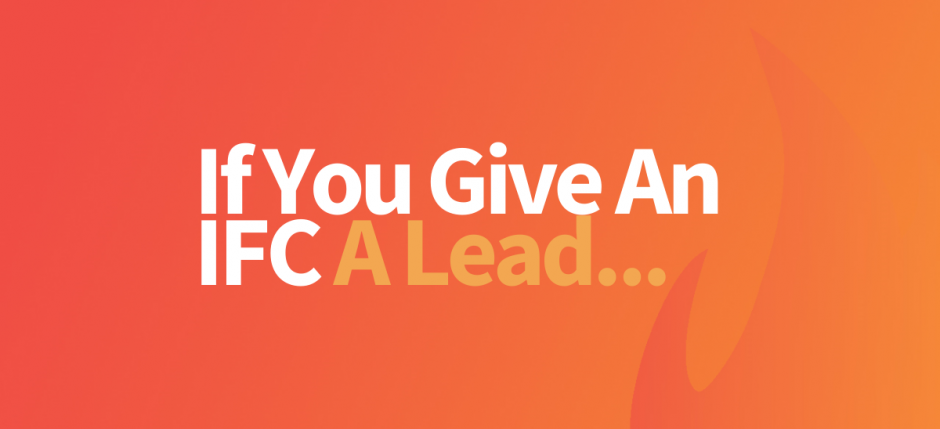If You Give An IFC A Lead
by Matt Mattson
Have you ever read that children’s book, “If You Give A Mouse A Cookie?”
Well, this post has absolutely nothing to do with that book. But that kids book title is what was in my head when I wrote this. Anyway…
This post is about one simple thing. If a lead comes into a council leader (specifically an IFC*), what should happen then?
First of all, it’s important to really stop and think about what a “lead” is. This is a real human. A person who has said, “I’m at least a little interested in this thing called fraternity.” Whether that lead comes through a form being filled out, a comment or DM through social media, a marketing campaign, or a chapter submission… the IFC has a chance to welcome that lead on behalf of the whole community (and set expectations for what it means to be a fraternity member that go beyond just the chapter level).
That’s a huge deal. Remember, 90% of people NEVER say they’re interested so if this person is showing interest it means they’ve cut through the negative image issues, they’ve waded through the wildly confusing noise of websites, marketing campaigns, social media posts, GreekRank, word-of-mouth, and a thousand other inconsistent and bewildering messages to find a way to raise their hand and vulnerably demonstrate some interest.
That’s a huge deal. Let’s treat it as such.
Now, let’s take a moment to name things you should NOT do (you probably already know these things).
- SPAM them with impersonal messages
- Blast them with rush schedules
- Overwhelm them with too many texts, DMs, emails, or calls
- Not do anything and leave them hanging
- Probably some other stuff too, but you get the idea
So, what should you do?
We know that recruitment is a relationship business. We know that people join people. We know that people are longing for very personal human connection moments. We know that the IFC’s job includes creating opportunities for human connection, collecting and distributing data on PNMs, and managing the story of fraternity. And these are the principles that should guide your next 5 actions.
1) CONFIRMATION
Within minutes of completing a form or submitting their information, a lead should immediately receive confirmation of submission and recommended next steps. There should be a single primary call to action (CTA) in this initial confirmation. Here are a few options for the call to action.
- Follow us on Instagram for up-to-date details about recruitment.
- Complete this registration to officially register for recruitment.
- Complete this questionnaire so we can share more information about you with all of our chapters.
- Download our recruitment app.
- Visit this site for instructions on how to learn about (and join) fraternities.
2) PERSONAL CONNECTION
Within 48 hours of receiving a lead, the person should receive an initial point of contact from the IFC level. This should be someone who represents the entire fraternity community (an IFC recruitment leader or member of a “Street Team.“) The goal should be to build trust, put a human face on the idea of fraternity, and help the lead feel comfortable with the joining process.
As with all things, the more personal the better. An email, text, or combination of both can work. This should ideally be differentiated by the lead source (e.g. if it’s a registration form lead the response is directly about recruitment; if it’s a marketing campaign lead the response should be a softer approach).
An example text might be, “Chaz! My name is Matt. I’m a 3rd year comms major at Generic U. I got a note that you had some interest in leadership opportunities with fraternities on campus. I’m a fraternity man. Just wanted to wish you luck this semester. Can I share more info with you via text?”
Alternatively, you might send an email that could be a bit more thorough.
- Connect with a problem the recipient has
- Ex: “After spending the last 2ish years distanced from friends, I’m sure you are excited to make the most of your Generic U experience!”
- Share that you have a solution.
- Ex: “Just like your close friends from high school, I’m not sure what I would do without my fraternity brothers.”
- Present a clear call to action (CTA)
- Ex: Ask them to fill out a questionnaire or survey to learn more about them and so you can keep them up to date or ask a specific question they might respond to.
- Ex: “I’d love to make sure you stay up to date on all of the fun events we’ve got planned for the first few weeks of school. Can you please take 30 seconds and fill out this form here: xxxxxxxxxx”
3) FEED LEADS TO PREPARED CHAPTERS
The best way an IFC can provide value to chapters (and help with recruitment) is to funnel leads directly to chapters. Of course, we want those chapters to be as prepared as possible. Teaching, preparing, empowering, and trusting chapters to do their own recruitment well is a big part of the job of an IFC. Chapters should be receiving some training (we can help). Chapters should have members who are Phired Up Certified Recruiters. And the leads should be funneled directly into chapters’ ChapterBuilder accounts.
As soon as chapters have the leads, they can determine who and how to follow up. We would STRONGLY RECOMMEND sharing this resource with chapter leaders (and referencing it as an IFC team). Make sure chapters understand where your leads are coming from and what those leads know, don’t know, would be turned off by, and are likely seeking.
4) TEACH ABOUT COMMUNITY EXPECTATIONS
Leads should receive multiple points of contact from the IFC level. Probably 1-2 per week in the time leading up to and during the busiest recruitment periods of the year. Those should be a mix of a) information and education along with b) personal outreach from real people. Through both of these styles of contact, the IFC should be working to make clear the expectations they have about “what it means to be a fraternity man on this campus.” This resource titled, “People Like Us Do Things Like This” can be helpful, and this resource with actual videos to share can be helpful as well.
You have a major opportunity to teach these men what to look for in a healthy, safe, and inclusive chapter. You have a chance to help them avoid dangerous groups or situations. You can let them know what is and isn’t acceptable. Remember, people learn more about what it means to be a fraternity man before they join than at any other time. This is a big opportunity for the IFC to create the culture it craves on your campus.
Bonus: Create a message they can easily forward to their parents. Craft that message specifically with parents in mind. Ideally feature a video that is a parent talking honestly and transparently to other parents about concerns they might have.
5) REMIND ABOUT KEY DATES
This is the easy one. There will be times (after you’ve worked to build trust and make personal outreach efforts) when it is appropriate to simply remind leads about key dates and opportunities for joining. When preparing these, put yourself in the shoes of a completely clueless first year student. Don’t use jargon, acronyms, building nicknames, or anything else that could possibly confuse a new student. Offer links to directions, maps, and transportation options (if applicable). Be overly thoughtful, welcoming, and affirming to all so that everyone who receives these points of contact know that they’re welcome.
*This blog was written specifically for IFC leaders because we were working on a project with the NIC that was only for IFC communities. We wanted to provide a resource for that group. Anyway, there’s lots of applications here for other council’s too, and we’ll probably make the universal version of this at some point.

